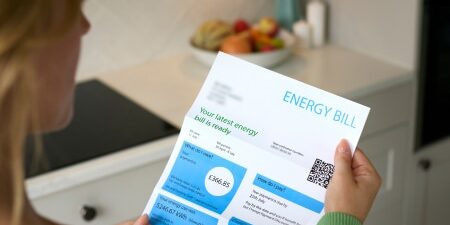Managing energy debt can be overwhelming, especially when utility bills become unsustainable. To help you stay in control of your finances, this guide provides an overview of what utility debt is and how, if at all, it may be possible to write off this form of debt.
What is utility debt?
As the name suggests, utility debt simply refers to the outstanding payments that a household or business owes to utility providers for services such as electricity, gas, water, and sometimes even internet and phone services. Utility bills are typically issued on a monthly or quarterly basis, and failure to pay these bills on time, can result in debt accumulation.
As utility costs rise, many people find themselves struggling to keep up with payments, leading to significant financial stress.
Utility debt can become a major burden, especially when compounded with other financial obligations. It’s important to understand how this debt works and explore potential solutions if you’re struggling to manage your utility payments.
Can you switch energy suppliers with debt?
One common question is whether it’s possible to switch energy suppliers while in debt. The answer depends on the type and amount of debt you owe. If you are on a prepayment meter and owe less than £500 for gas or electricity, for example, you can switch suppliers under the Debt Assignment Protocol.
This protocol allows you to transfer your debt to a new supplier, potentially helping you find more affordable rates and manage your payments more efficiently.
For those not on a prepayment meter, or who owe more than £500, switching suppliers while in debt is generally not permitted until the debt is cleared. That being said, it’s worth contacting potential suppliers to discuss your options, as some may offer assistance or advice on managing your debt.
What happens if you refuse to pay energy bills?
Refusing to pay energy bills can lead to serious consequences. Initially, your utility provider will send reminders and warnings about outstanding payments. Ignoring these can escalate the situation, leading to several potential actions.
Late payment fees may be applied to your account, increasing your overall debt. Your debt may be passed onto a debt collection agency, which will then pursue you for the outstanding amount. Utility companies can take legal action to recover the debt, which may result in a court order.
As a last resort, your energy supply may be disconnected. This is typically a final measure after multiple warnings and attempts to recover the debt.
Avoiding these outcomes is crucial. If you’re struggling to pay your energy bills, it’s best to communicate with your supplier to explore payment plans or seek financial advice.
Looking for ways to cut down on your energy usage? Check out our guide exploring Energy Saving Tips.
How long can energy companies chase you for debt?
Energy companies can pursue you for debt for a specific period, known as the statute of limitations. In the UK, the statute of limitations for utility debt is typically six years from the date the debt was incurred.
This means that if no payment or acknowledgement of the debt has been made within six years, the debt becomes statute-barred, and the utility company can no longer take legal action to recover it.
However, it’s important to note that while the debt may be statute-barred, it doesn’t disappear. The utility company may still contact you to request payment, but they cannot enforce it through the courts.
Can energy debt be written off?
Energy debt can sometimes be written off or significantly reduced through various debt management solutions such as Individual Voluntary Arrangement (IVA), but generally only if the arrears are with a previous service provider.
An IVA is a formal agreement between you and your creditors to pay back your debts over a set period, usually five years. At the end of this period, any remaining debt that was included in the IVA is written off. An IVA can include utility arrears providing they are from a previous provider. This can make your overall debt more manageable.
A Debt Management Plan (DMP) is an informal agreement with your creditors to repay your debts at a rate you can afford. While a DMP doesn’t write off debt and might not include utility arrears, it can make your payments more manageable and reduce financial stress. In extreme cases, a Debt Relief Order (DRO) or Bankruptcy may be considered.
Both options can lead to the discharge of unsecured debts, including utility arrears. But they come with significant long-term consequences and should be carefully considered.
If you’re struggling with energy debt, it’s essential to get professional advice to explore the best solution for your situation. Financial advisors and debt relief services can help you understand your options and develop a plan to regain control of your finances.
Remember, while energy debt can be daunting, there are ways to manage and potentially write-off this type of debt. Understanding your options and seeking timely advice can make a significant difference in managing utility debts effectively.

To discover more about how to manage your debt and to receive free debt advice, you can visit www.moneyhelper.org.uk.
See what options are available
There are always solutions, no matter what your situation

